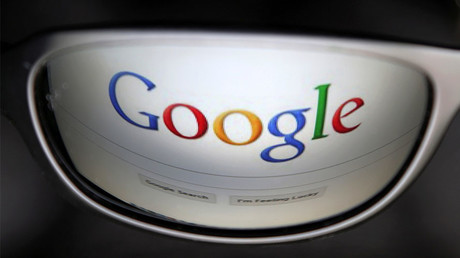Internet giants block opposing views, threaten open web – US watchdog chief
Internet giants are deciding what content users see and
routinely block or discriminate against content they don’t like, which
makes them a threat to an open internet, the head of the US
communications watchdog says.
Federal
Communications Commission (FCC) head Ajit Pai argued on Wednesday
against critics who said the White House’s move to reverse the Obama
administration’s net neutrality rules would spell the demise of the web.Referring to so-called ‘edge providers’ – companies such as Google and Amazon that provide online services such as websites or streaming – Pai said: “They might cloak their advocacy in the public interest, but the real interest of these internet giants is in using the regulatory process to cement their dominance in the internet economy.”
He was speaking at a panel on the future of internet freedom hosted by libertarian think tank R Street Institute.
Edge providers, that also include companies such as Netflix and Facebook, normally use the customer's internet service provider (ISP) to deliver content.
Chairman Pai sets the record straight on his Restoring Internet Freedom Order, rebutting myths with facts here: https://t.co/vjEWfDAV2M
— The FCC (@FCC) November 28, 2017
Taking aim at social media platforms, the FCC chief said Silicon Valley companies are already doing this by promoting some viewpoints while suppressing others. “I love Twitter,” said Pai.
“But when it comes to a free and open internet, Twitter is part of the problem. The company has a viewpoint and it uses that viewpoint to discriminate.”
The microblogging service “appears to have a double standard when it comes to suspending or de-verifying conservative users’ accounts as opposed to those of liberal users,” he went on, before adding: “Indeed, despite all the talk about the fear that broadband providers could decide what internet content consumers can see, recent experience shows that so-called edge providers are in fact deciding what content they see. These providers routinely block or discriminate against content they don’t like,” he reiterated.

As an example, Pai noted Twitter’s decision to prevent Republican Senate hopeful Marsha Blackburn from advertising a campaign video with controversial remarks about abortion, in which the congresswoman said she had fought Planned Parenthood and helped “stop the sale of baby body parts.”
Pai said “the examples from the past year alone are legion,” adding that they range from “app stores barring the doors to apps from even cigar aficionados because they are perceived to promote tobacco use” to streaming services “restricting videos from the likes of conservative commentator Dennis Prager on subjects he considers ‘important to understanding American values.’”
He also took aim at “algorithms that decide what content you see (or don’t), but aren’t disclosed themselves,” and online platforms “secretly editing certain users’ comments.” Earlier in October, investigative group Project Veritas secretly filmed Earnest Pettie, the Brand and Diversity Curation Lead at YouTube, who said he works “on a team that does provide some human inputs into a lot of the machinery of YouTube.”

In November, Eric Schmidt, the executive chairman of Google’s parent company Alphabet, admitted that the company will “engineer” specific algorithms for RT and Sputnik to make their stories less prominent on the search engine’s news services. “We are working on detecting and de-ranking those kinds of sites – it’s basically RT and Sputnik,” Schmidt said at the Halifax International Security Forum in Canada.
Pai distinguished between edge and broadband providers. Many of the latter – including AT&T, Comcast, and Verizon – favored the repeal of Obama’s net neutrality rules which they say will allow the internet to return to the free market environment.
On the other hand, services such as Twitter, Google, and Facebook have favored the existing rules. “Edge providers,” Pal asserted, “are a much bigger actual threat to an open internet than broadband providers, especially when it comes to discrimination on the basis of viewpoint.”
The FCC chairman vowed to lift net neutrality protections adopted by the watchdog under the Obama administration. According to these rules, broadband service providers like AT&T and Verizon are prohibited from cornering segments of the internet and charging extra fees. For example, instead of standard broadband speed, ISPs could soon offer variations on quality, and charge customers accordingly.
The FCC position is that current legislation limits the freedom of internet companies, arguing that red tape is hampering investment in online service.
You can't just put fact next to your opinion and make it do. This is all bull and you know it. https://t.co/qegRedlmzc
— Austin Fern (@fern0830) November 28, 2017
Chairman @AjitPaiFCC’s Restore Internet Freedom proposal is publicly available but myths still surround it. Learn more: https://t.co/41dJiz0RVN pic.twitter.com/GAFC18rxOu
— The FCC (@FCC) November 29, 2017
Independent Internet?
The Russian Security Council has asked the country’s government to develop an independent internet infrastructure for BRICS nations, which would continue to work in the event of global internet malfunctions.
The initiative was discussed at the October meeting of the Security Council, which is Russia’s top consultative body on national security. President Vladimir Putin personally set a deadline of August 1, 2018 for the completion of the task, the RBC news agency reported.
While discussing the issue, members of the council noted that “the increased capabilities of western nations to conduct offensive operations in the informational space as well as the increased readiness to exercise these capabilities pose a serious threat to Russia’s security.”
They decided that the problem should be addressed by creating a separate backup system of Domain Name Servers (DNS), which would not be subject to control by international organizations. This system would be used by countries of the BRICS bloc – Brazil, Russia, India, China and South Africa.

The issue of excessive dependency on global DNS has previously been addressed by Russia. In 2014, the Russian Communications Ministry conducted a major exercise in which it simulated the “switching off” of global internet services and used a Russian backup system to successfully support web operations inside the country.
However, when reporters asked Vladimir Putin’s Press Secretary Dmitry Peskov if the country’s authorities had been considering disconnecting from the global internet in 2014, Peskov dismissed these allegations as false.
“Russia’s disconnection from the global internet is of course out of the question,” Peskov told the Interfax news agency. However, the official also emphasized that “recently, a fair share of unpredictability is present in the actions of our partners both in the US and the EU, and we [Russia] must be prepared for any turn of events.”
“We all know who the chief administrator of the global internet is. And due to its volatility, we have to think about how to ensure our national security,” said Peskov. It’s not about disconnecting Russia from the World Wide Web, he added, but about “protecting it from possible external influence.”


Post a Comment Blogger Facebook Disqus